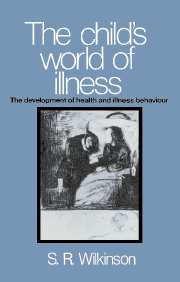Book contents
- Frontmatter
- Contents
- Acknowledgements
- Glossary
- 1 Presenting a problem
- 2 The form of dialogue
- 3 What has gone before: some background information
- 4 The primary structure to the child's world of illness
- 5 Germs and bugs: causal agents
- 6 Dirt and fresh air: the exogenous system
- 7 My castle and the good germs: the endogenous system and its boundary
- 8 ‘Pretend illness’: An analysis of how communication patterns can foster particular forms of complaints
- 9 The consultation: a form of dialogue
- 10 Health education and health promotion
- Appendixes
- References
- Index
5 - Germs and bugs: causal agents
Published online by Cambridge University Press: 23 September 2009
- Frontmatter
- Contents
- Acknowledgements
- Glossary
- 1 Presenting a problem
- 2 The form of dialogue
- 3 What has gone before: some background information
- 4 The primary structure to the child's world of illness
- 5 Germs and bugs: causal agents
- 6 Dirt and fresh air: the exogenous system
- 7 My castle and the good germs: the endogenous system and its boundary
- 8 ‘Pretend illness’: An analysis of how communication patterns can foster particular forms of complaints
- 9 The consultation: a form of dialogue
- 10 Health education and health promotion
- Appendixes
- References
- Index
Summary
The previous chapter described the ecological systems within which the child learns of illness, the systems' structures of rules, the questions and explanations, and routines and rituals. In addition the range of ways of communicating about illness and their variety of effects were described. The subsequent chapters will present the children's views of illness which evolved within that framework. I will often focus on causality, as the causes of illness are seen to have a very central place in organising people's conceptual frameworks about illness. It appears to be around causality that we attribute intentions and construct the moral order pertaining at times of illness; our concepts here organise to a high degree our ways of responding and determine our expectations of appropriate behaviour from others. Nevertheless I refer to causality rather than causes. As the nature of the child's understanding of sufficient causes for illness is presented, it will be seen that straightforward ideas of cause and effect are hard to find.
The children's views reported here emphasise what they regard as facts about illness, rather than the possible functions of illness within a system. The latter were mentioned in the previous chapter and incorporated by the children in two ways: they mistakenly become part of the child's facts about illness, as well as enabling the child to be effective in altering systems through illness. With growing reflection it is seen how the effects can be turned to advantage in negotiating status on the basis of illness rationales.
- Type
- Chapter
- Information
- The Child's World of IllnessThe Development of Health and Illness Behaviour, pp. 110 - 130Publisher: Cambridge University PressPrint publication year: 1988



